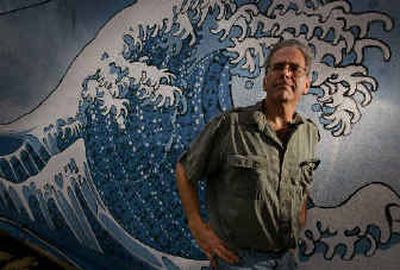Tsunami tragedy has businesses rethinking names

EUGENE, Ore.— In the weeks since the catastrophic Indian Ocean tsunami, Scott Landfield has seen his bookstore’s online sales quadruple.
But he doesn’t carry a special selection on earthquakes or natural disasters. The spike in business appears related solely to the store’s name: Tsunami Books.
The progressive, independent store in Eugene has used the name since opening nine years ago. It even sports a mural above the front entrance depicting a crashing wave.
Look closely and one can make out human faces — some smiling, some somber in the water.
Online shoppers have patronized Tsunami Books at a far greater rate since the Dec. 26 tragedy that killed more than 160,000 people.
“The word certainly has gained some familiarity,” Landfield said. “It appears that when people saw our name, their finger twitched.”
Worldwide, businesses that use the word tsunami are reflecting on the connotation of the Japanese word meaning “harbor wave” and the added attention the tragedy in Asia has brought them. Some companies want to distance themselves from the word altogether.
Toyota Canada is abandoning plans to name one of its most popular models of sports cars — the Celica Tsunami.
In Scotland, a brand management company called Tsunami is overhauling its corporate identity.
In South Africa, a restaurant chain will rename its spicy tsunami chicken burger. And a Wisconsin water park announced it will change the name of its Great Tsunami outdoor wave pool.
Other firms that saw their Web sites jammed with traffic in the days after the disaster steered visitors to organizations such as the Red Cross and UNICEF. Tsunami Research, a St. Louis, Mo., software company, posted a message saying it “wishes to express our condolences to the victims, families and communities impacted by the Indian Ocean tsunamis.”
Manhattan-based Tsunami Computing, owner of the tsunami.com Web site, organized a charity drive to help victims and filled the site’s front page with links for disaster-relief donations and international aid organizations.
On the Oregon coast, Pelican Pub & Brewery in Pacific City announced it would donate 10 percent of the sales of its popular Tsunami Stout, introduced in 1996, to Portland-based Northwest Medical Teams International, which sent volunteers to Thailand, Sri Lanka and Indonesia.
“We took a stance of being proactive,” General Manager Donn Brouhard said, adding that sales of the microbrew are up.
Hundreds of businesses incorporate tsunami into their names or the name of products, from women’s fashion fleece to men’s body spray to a watch by Swatch and restaurants in San Francisco and Memphis, Tenn. Entrepreneurs are drawn to the word for different reasons. To some it expresses power and speed. To others, it sounds exotic, even graceful.
But now that the word tsunami evokes death and destruction on an unimaginable scale, will it taint those commercial enterprises that continue to use the term?
Kit Chan, owner of Kowloon restaurant in Eugene, renamed his nightclub Club Tsunami about six years ago when a University of Oregon student came up with the name in a contest. It seemed to fit, Chan said, because of the views of water in neighboring Alton Baker Park.
It also made it easy to redecorate with a beach theme, he said. Crashing waves are depicted on several walls.
Chan said he has had no negative feedback on the name in recent weeks. He even asked customers what they thought; many had not realized what the word meant before.
“Since the disaster, a lot of people know what that means now,” he said. “That name sticks in your head.”
Landfield, the co-owner of Tsunami Books, said a couple of customers have suggested a name change. In response, he explained that the term describes a part of nature, and nature is not inherently evil or wrong.
One fellow tried to advise him how to capitalize on the public’s interest in the tragedy. “We paid no attention to it,” he said.
The store’s founders chose to use tsunami as a play on the term tidal wave — “A mighty wave of titles,” a sign out front proclaims — and because nearby Spencer Butte sometimes looks like a big wave when clouds roll over it on stormy days, Landfield said.
As for the wave mural and the company’s logo — Mark Twain surfing on his book “A Tramp Abroad” — the images aren’t cause to wince, he said.
“But to have those faces in a wave in front of our building here, that’s worth thinking about a little,” Landfield said.